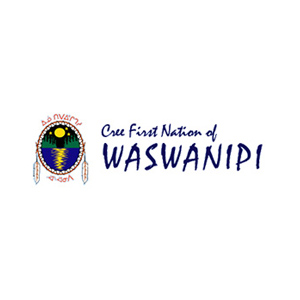CREE FIRST NATION OF WASWANIPI
SFI Is Supporting the Transfer of Scientific and Traditional Knowledge to Cree Youth in Waswanipi
Marten Monitoring and Youth Knowledge Transfer
Why this project matters
Indigenous youth are Canada’s fastest-growing demographic group. At the same time, many of these Indigenous youth feel unsure of the opportunities they will be able to enjoy as adults. The Marten Monitoring and Youth Knowledge Transfer project will help youth see how the Cree way of life still connects very strongly to the land. It will pass on the values that teach the Cree to take only what they need from the land and ensure the continued existence of forests, rivers and wildlife. The program will also introduce Cree youth to scientific concepts and encourage them to consider careers as wildlife and resource professionals.
The monitoring program, based in the Cree community of Waswanipi, 700 kilometres/435 miles north of Montreal, will evaluate the impact of wildlife management guidelines on marten populations. The monitoring program combines western science and traditional knowledge aimed to transfer knowledge to Cree youth in the community. The monitoring program will also support the implementation of Cree standards and wildlife management for Cree wildlife sites of interest on Waswanipi lands.
The project will bring Cree youth to the trap line to monitor wildlife in an educational way, using scientific and traditional knowledge. They will participate in all the steps of the monitoring, from the elaboration of measuring instruments to the analysis of data, and will learn from the proven tracking methods of their forefathers. Learning will take place with peers in a natural setting as much as possible. The monitoring program will also include formal training with wildlife-monitoring techniques, which could potentially lead to career opportunities in resource and wildlife management.
Why is SFI involved?
SFI values this project because it will help transfer knowledge to youth and combine traditional and scientific approaches. The project’s potential to lead to career opportunities in resource and wildlife management is another key reason for SFI’s support.
One of SFI’s priorities is to connect youth to forests through education. We look for ways to instill a lifelong appreciation for the value forests represent for biodiversity, the broader environment, sustainable communities, responsibly sourced forest products and for our shared quality of life. The educational focus of this project also supports SFI’s focus on encouraging the next generation of future forest leaders.
Our work with Girl Guides of Canada, Scouts Canada, Boy Scouts of America, and other youth organizations and school programs like Earth Rangers and Project Learning Tree helps build healthy kids. It also engages youth in conservation activities and outdoor education.
Our kids’ contact with nature keeps shrinking. Today’s emphasis on screen time and indoor play is also linked to psychological and physical effects like obesity, loneliness, depression and attention problems. Getting kids into forests and helping them learn about sustainability is good for forests and good for kids.
How the project builds SFI community engagement
This project stands out from standard scientific monitoring programs because it advocates the integration of traditional knowledge from trappers and elders of the community in the development of protocols and the establishment of the monitoring.
The project also gives Resolute Canada and other SFI Program Participants in the Quebec SFI Implementation Committee an opportunity to engage directly with the community of Waswanipi. It will ultimately lead to a new rigorous resource management tool developed by and for the community, which could include prescribed guidelines for companies who work in the territory and who are likely to have an impact on the natural environment or on the practice of Cree traditional activities.
Partners
This partnership includes representatives from non-profit groups and SFI Program Participants. These partners include:
- Project lead: Cree First Nation of Waswanipi
- Sustainable Forestry Initiative
- The Gull Family
- Willie J. Happyjack Memorial School
- Waska Resources
- Cree Trappers Association
- Resolute Canada (SFI Program Participant)
- Quebec SFI Implementation Committee (consisting of SFI Program Participants)
Related information
- Read the SFI fact sheet: Addressing Indigenous Interests and Building Partnerships.
- Heiltsuk First Nation: Heiltsuk Culturally Modified Tree Database and Management System
- Montreal Lake Cree Nation Certified to SFI Standard to Enhance Forestry Operations and Community Sustainability
- SFI helped support the Native Earth Environmental Youth Camp, which is devoted to sustainable science and traditional ecological knowledge and run by the State University of New York in partnership with the Haudenosaunee Environmental Task Force.
- Cree First Nation of Waswanipi

About Cree First Nation of Waswanipi
The modern community of Waswanipi is located on Highway 113 along Waswanipi River and is accessible by road. Waswanipi means « Light on the Water », it describes our past when we used the torch light fuelled by pine tar, to spear and catch sturgeon that had gathered to spawn at the mouth of Waswanipi River.
While the development of the region has had an impact on our lands and community, we are committed to the sustainable management of our resources. Our hard work and dedication with the model forest networks is an example to what can be achieved through proper consultation and research on development with our respective traditional territory. We have locally owned businesses to provide you with meals, groceries, supplies and equipment. We have hiking and cross-country ski trails, rustic camping spots, and a number of beautiful lakes and several challenging rivers for canoeing and kayaking.
Share
COPY LINK: https://forests.org/grantcreefirstnationofwaswanipi/